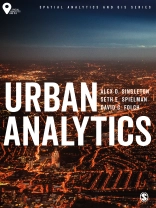The economic and political situation of cities has shifted in recent years in light of rapid growth amidst infrastructure decline, the suburbanization of poverty and inner city revitalization. At the same time, the way that data are used to understand urban systems has changed dramatically.
Urban Analytics offers a field-defining look at the challenges and opportunities of using new and emerging data to study contemporary and future cities through methods including GIS, Remote Sensing, Big Data and Geodemographics.
Written in an accessible style and packed with illustrations and interviews from key urban analysts, this is a groundbreaking new textbook for students of urban planning, urban design, geography, and the information sciences.
Содержание
Questioning the City through Urban Analytics
Sensing the City
Urban Data Infrastructure
Visualizing the City
Differences within Cities
Explaining the City
Generative Urban Systems
Cities as Networks and Flows
The Future of Urban Analytics
Об авторе
David Folch is an Assistant Professor in the Department of Geography at Florida State University. His research focuses on spatial analytical methods, with a contextual interest in US cities and neighborhoods. His approach to research sits at the intersection of geography, economics and computer science, which in practice means merging geographic and economic theories with high-performance computing and large datasets to address research questions with distinctly spatial manifestations. His work has involved developing improved measures for residential segregation and the creation of spatial approaches for reducing uncertainty in American Community Survey estimates. He holds degrees in geography and economics.












